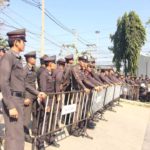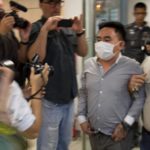American Watchdog slams Thai human rights
An American watchdog criticized the continued repression of freedoms exercised by the Thai military junta in its latest report on Thailand released Friday.
New York-based Human Rights Watch said in its 2018 report for Thailand that sweeping, unchecked and unaccountable military powers continued to be in place despite the promise of free and fair elections at the end of the year.
“Section 44 of the 2014 interim constitution allows Prime Minister Gen. Prayuth Chan-ocha, in his current position as NCPO chairman, to wield absolute power without oversight or accountability,” the report said. “The 2017 constitution, promulgated in March, endorses the continuance of this power, thereby guaranteeing that both the NCPO and officials operating under its orders cannot be held accountable for their rights violations.”
Freedom of Speech Under Threat
The report chronicled intimidation and punishment meted on media outlets that publish content critical of the junta and the monarchy.
“Media outlets that refused to fully comply, including Voice TV, Spring News Radio, Peace TV, and TV24, were temporarily forced off the air in March, April, August, and November respectively,” the report said. “These stations were later allowed to resume broadcasting when they agreed to practice self-censorship, either by excluding outspoken commentators or avoiding political issues altogether.”
The watchdog said that in Nov. 27 last year a peaceful protest in Songkhla province was violently dispersed.
Elsewhere, it said sedition laws and the Computer Crimes Act had been used against prominent politicians and journalists “to criminalize criticism and peaceful opposition to military rule”.
On the Computer Crimes Act, Human Rights Watch said the law “provides the government with broad powers to restrict free speech and enforce censorship”.
“The law uses vague and overbroad grounds for the government to prosecute any information online that it deems to be “false” or “distorted,” including allegations against government officials regarding human rights abuses.”
On the lese majeste law, the rights watch said that those charged are systematically denied bail and held in prison for years while awaiting trial.
Secret Detentions
Other issues highlighted included secret detention in the Deep South, where suspected separatists are detained for up to seven days without charges.
“The government also regularly uses military detention, in which abuses during the interrogation occur with impunity, in its counterinsurgency operations against suspected separatist insurgents in the southern border provinces of Pattani, Yala, and Narathiwat,” the report read.
“The NCPO in 2017 rejected calls by human rights groups to disclose information about persons held in secret military detention, and summarily dismissed all allegations that soldiers tortured detainees,” referring to the military junta, formally the National Council for Peace and Order.
Attitude Adjustment
Human Rights Watch noted that in 2017, the NCPO continued to summon members of the opposition Pheu Thai Party and the United Front for Democracy Against Dictatorship, or UDD – as well as anyone opposing military rule – for talks and detentions without charge which it called “attitude adjustment”.
“Failure to report to the junta’s summons is considered a criminal offense,” the report read.
Asylum Seekers, Refugees and Migrant Workers
The report said that migrant workers from Myanmar, Cambodia, Laos and Vietnam continued to be vulnerable to “physical abuses, indefinite detention, and extortion by Thai authorities; severe labor rights abuses and exploitation by employers; and violence and human trafficking by criminals who sometimes collaborate with corrupt officials.”
What’s more, the report stated that migrant workers remained fearful of reporting abuses to Thai authorities due to lack of effective protection.
On the Rohingya refugees, the report said in September, the Internal Security Operations Command, or ISOC, announced a policy to push back Rohingya refugees seeking to enter the kingdom by boat.
“The government also refused to allow the UN Refugee Agency, UNHCR, to conduct refugee status determinations for Rohingya asylum seekers, and planned to put those who landed in indefinite lockups,” the report said, adding that over 60 ethnic Uighurs from China have been held in indefinite detention since March 2014.
Concerns for the Future
On Thailand’s future prospects, the report said that even if there were to be elections this November, an unelected senate would lay foundations for “prolonged military control.”
Source: Khaosod




